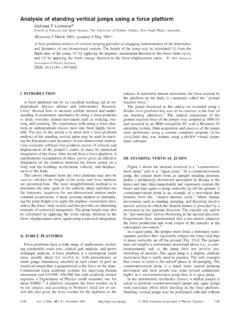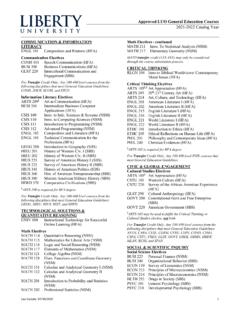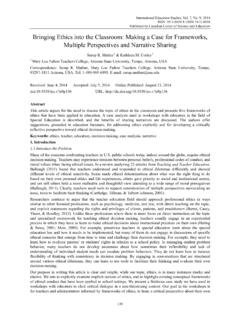Transcription of RESEARCH ETHICS HANDBOOK: PHILOSOPHY, HISTORY AND …
1 RESEARCH ETHICS HANDBOOK: PHILOSOPHY, HISTORY AND THEORY. RESEARCH ETHICS Handbook Version Table of Contents 1 Philosophy of RESEARCH 4. Ethical codes .. 4. Ethical issues ..5. Ethical approaches ..5. Cultural relativism ..5. Egoism .. 6. Absolute moral 6. The social contract .. 6. Rights approach .. 6. Justice Common good approach ..7. Virtue approach ..7. The humane community The basis for all ethical decision-making ..7. 2 HISTORY of RESEARCH ETHICS .. 8. Key milestones .. 8. The National Health Service .. 9. Local RESEARCH ETHICS Committees .. 9. University RESEARCH ETHICS Committees .. 10. Department of Health RESEARCH Governance Framework.
2 10. Recent updates .. 10. Professional associations and funding organisations .. 11. 3 Theory of RESEARCH ETHICS .. 11. Theoretical aspects .. 11. Goal-based .. 12. Duty-based .. 12. Rights-based .. 12. Page 2 Revised May 2015. RESEARCH ETHICS Handbook Ethical principles and rules .. 12. Ethical principles .. 12. Ethical rules .. 13. Practical application of ethical principles and rules .. 13. Consent .. 13. 15. Types of 17. Risks .. 19. Deception .. 19. Notification of study participation .. 20. Requirements of professional bodies .. 20. 4 20. 5 Appendix A: Short texts .. 21. Anonymity and Confidentiality .. 21. Consent in RESEARCH ETHICS .
3 22. Consent related to human tissue .. 25. Criminal Records Bureau CRB checks for researchers .. 28. Does my RESEARCH project need ethical review? .. 29. Insurance matters and RESEARCH .. 32. Intellectual Property Rights .. 33. RESEARCH involving adults unable to consent for themselves and children . 35. Negligent/Non-Negligent Harm .. 39. Scientific Fraud and Bad RESEARCH Practice .. 40. Data protection and the use of personal data in RESEARCH .. 45. RESEARCH Participant Information 48. Recruitment of participants .. 53. Risk Assessment .. 55. What is the supervisor's role in the RESEARCH ETHICS process? .. 56. Revised May 2015 Page 3.
4 RESEARCH ETHICS Handbook Version 1 Philosophy of RESEARCH ETHICS Plato (427 - 347 BCE) was a student of Socrates and in his writing transmits Socrates' teachings. The main thrust of this comes in his middle and later periods, the Republic being the most important. Plato highlights virtue which he equates with knowledge, to be virtuous is to know the good which is changeless, immaterial, transcendent and absolute. Aristotle (384 - 322 BCE) was Plato's pupil. His writings on ETHICS have as their basis the search for the chief human good. This, he argues, comes from the ethical virtues that come from human reasoning. Each virtue is the pivotal point between excess and defect.
5 Virtues are not just rules by which we live but should encompass the whole of a person's philosophy of life and determine concerns, desires, emotions and perceptions of virtually everything as well as governing the actions that a person takes. Ethical codes These principles have been the foundation for ethical codes since then and have been updated to take into account developments in the world. One of the best examples of this is the medical codes of practice. There have been medical codes of practice from ancient times, the most famous of these being the Hippocratic Oath, emphasising the need for the practitioner working to the highest possible standards and with total confidentiality in the care of patients.
6 Contrary to popular belief, there are few medical schools where pupils take this or any other medical code of practice oath! Codes of medical practice are needed for many reasons, although many would argue that medical ETHICS involves no more than applying good manners and that anyone with high moral principles does not need rules. This, however, takes an over-optimistic view of human nature. This was seen in the experiments carried out by some doctors in Germany and Japan during the Second World War, which lead to the trials of 1947 and the writing of the Nuremberg code. Another important reason for having such codes is to regulate the RESEARCH that is being carried out so that it protects the participants from overzealous practitioners who are willing to overstep the limits in order to strive for cutting edge results.
7 Other important codes that have emerged in recent years are: The Declaration of Geneva (1948 & 1968) which brought together many of the previous declarations. The Declaration of Sydney (1968) which specifically deals with the issue of death, especially in the field of transplants. The Declaration of Tokyo (1975) is a declaration on torture and other cruel, inhuman or degrading treatment or punishment. Page 4 Revised May 2015. RESEARCH ETHICS Handbook The Declaration of Hawaii (1977) dealing with psychiatric medicine. The codes used in medicine have been further developed outside of the medical field to provide structures for professional self-regulation.
8 Ethical issues come into almost all professions: medicine, law, nursing, science, education , social work, engineering, counselling, architecture, journalism, computer science, etc. Ethical issues The role of a professional is to be a trusted adviser by virtue of their professional knowledge. But given the nature of certain professions, ethical issues arise. Primarily, the professional is often held in high regard and trusted by clients and public because of their (perceived) knowledge. When a professional asks a client or member of the public for their consent to do something the client can feel unable to decline. Or the professional may believe it is not in the best interest of the client to obtain their consent and that the decision to carry out RESEARCH should rest with the professional.
9 Many professionals also face the ethical issue of confidentiality. It may be necessary for the professional to gain information from the client that the client would not be happy to disclose to others. There are the ethical issues of truthfulness; results that may emerge from RESEARCH may not be known to the client, would keeping the results from the client be for the client's good? Does this justify actively deceiving clients? Ethical approaches There are a number of ethical approaches that determine the way we live, work and do RESEARCH . Utilitarianism The most commonly held approach is utilitarianism. Utilitarianism is attributed to Jeremy Bentham (18th &19th Centuries).
10 It seeks to find the greatest benefit to society from our actions. Bentham's motto was the greatest good for the greatest number . This is a very democratic approach to ethical decision making, voting and allowing the majority to decide the outcome. It assumes that people are generally to be trusted to make good ethical choices. But there are limits: the majority of people could make choices that are not ethical. Cultural relativism Everything is relative. This is attributed to Franz Boas (early 20th Century). It asserts that whatever we do should be understood in terms of the culture in which we live and work. What might be ethical in one culture might be unethical in another.













